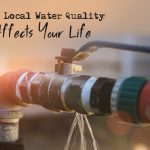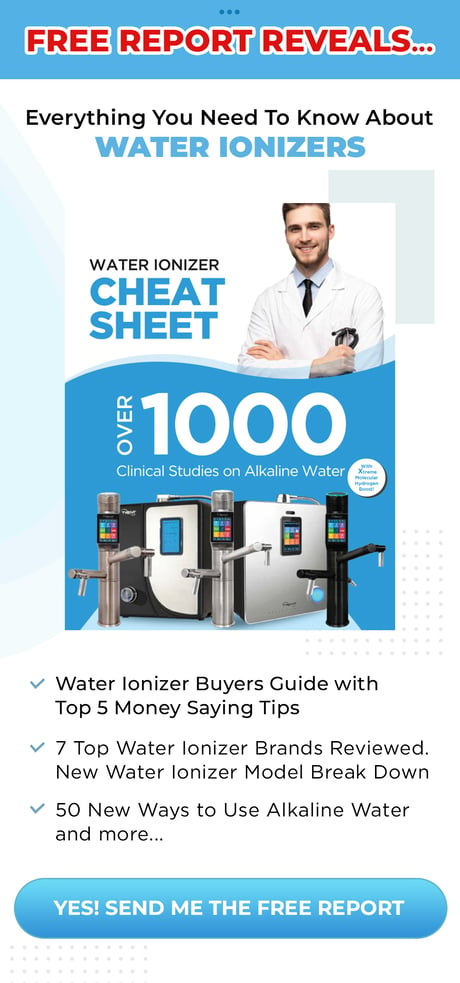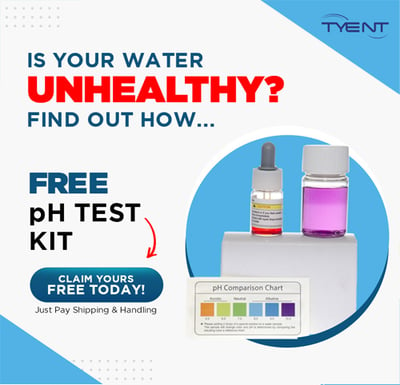If you’ve just downloaded your free water report, you’ve seen a list of the contaminants in your local tap water. But what does that mean for you and your family? And what are the best alternatives?
Research on water and hydration shows a few key facts about the differences between water, whether that’s tap, bottled water, reverse-osmosis water, or alkaline ionized water.
Tap Water
Tap water protects us from the mass contamination found in well water, which is an important advancement in water technology. But chemicals are added to tap water to do a number of things, like adjust the pH and remove contaminants (such as chlorine) to kill biological toxins. Though tap water is now regulated by the Environmental Protection Agency (EPA) and Congress passed the Safe Drinking Water Act in 1974, the materials used to convey the water (copper, steel, plastic) can cause issues like lead leaching, infusing water with mineral impurities or contaminants.
While tap water is still the most common type of drinking water, the potential for contamination and added chemicals caused many people to move towards bottled water, or look for other ways to “purify” their drinking water directly in their own homes.
Bottled water
Many people buy bottled water today because of the perceived health benefits of not having extra chemicals added (like those in tap water). Bottled water can contain water from a variety of sources, including spring, sparkling and filtered.
While water from these sources isn’t exposed to the same chemicals and gives people peace of mind about the quality of water they are drinking, there have been concerns over the authenticity of certain water branded as “spring water,” as well as a growing concern over the “one-and-done” use of plastic bottles on the environment. One such example happened in 1999, when the Natural Resources Defense Council (NRDC) released findings from a four year study on bottled water, claiming that one-third of the bottled waters tested contained levels of contamination.
Reverse osmosis water
So if tap and bottled water can include so many bad materials, why not completely remove them? Reverse osmosis systems filter water through a membrane to strip out unwanted minerals. Hitting its popularity stride in the 2000s, these systems have become a recent trend.
Though the membrane does filter out contaminants, it also strips water of the good, healthy minerals, making the water acidic. Similarly, popular water filters (like those found in filtration pitchers) also get rid of contaminants, but unfortunately leave the water totally devoid of any good minerals. Reverse osmosis systems also waste a lot of water, recovering only 5-15% of the water entering the system. The remainder is discarded as waste water.
Alkaline ionized water
The latest evolution in water is at-home water ionizers that produce antioxidant-rich alkaline ionized water. While tap and bottled water have the potential to include contaminants, and reverse osmosis water is totally devoid of even the good minerals in water, water ionizers provide mineral-rich, clean water, allowing you to separate wanted and unwanted minerals.
Water ionizers are either connected to the faucet via the countertop or under the counter. And new advances in at-home water ionizers are now providing advanced filtration systems that do more than just purify the water. They can create highly-oxygenated, antioxidant-rich water (which provides more antioxidants than a glass of orange juice!).
Water ionizers provide pH-balanced water with smaller molecules clustered together in a hexagonal shape for quicker absorption and easier movement throughout the body, helping you stay more hydrated for a longer period of time and keeping your body environment less acidic.
Are there proven health benefits to drinking alkaline ionized water?
Yes! To start learning more about the benefits of alkaline water, take a look at all of Tyent’s press coverage. Our water ionizers are often featured in the media as a high-tech way to improve your health and add nutrients to your drinking water.
You may also want to watch some video testimonials of real Tyent customers talking about the benefits they received from drinking our water. Then there’s the research we’ve conducted alongside top doctors and health experts that prove how our water can impact your health and well-being.
Overall, the main benefits of alkaline water include:
- A filtration process that produces mineral-rich water. Tyent’s water ionizers only filter out the unwanted minerals, leaving good minerals (such as calcium) in your water.
- Ionized water molecules help you stay more hydrated. Water that has been ionized possesses smaller molecules that are clustered together in a hexagonal shape for better and quicker absorption, helping you stay more hydrated for a longer period of time.
- The pH level of alkaline water, ideally between 6.9 and 7.2, helps maintain a healthy environment within our bodies.
- Alkaline ionized water is high in antioxidants. Tyent water ionizers produce alkaline water, which adds healthy antioxidants to your everyday water.
So, what’s next?
Are you looking for the healthiest and cleanest way to hydrate yourself and your family, straight from your kitchen faucet? Our line of water ionizers suits every need—whether you’re interested in an over-the-counter or below-the-counter unit—and will let you provide the best water available to your family and yourself.
If you’re wanting a smaller taste of what our larger units have to offer, let us introduce you to the TYgo. This pitcher-sized water alkalizer re-mineralizes and ionizes ordinary tap water, while filtering out chlorine, heavy metals, and bacteria. Your water will taste fresh—and it’ll be contaminant-free.
Want to see alkaline ionized water in action?
If you’re still curious about the differences between tap water and alkaline ionized water, check out this video where a tomato is washed with both regular and alkaline water. You’ll be impressed at what alkaline water actually does, and you may be astonished at what your tap water isn’t doing.








